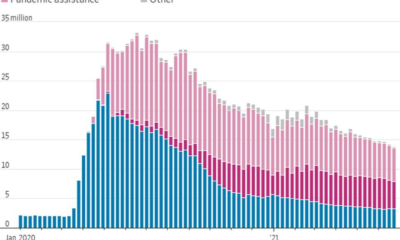Real Estate
UVic 2023 best diversity employer University of Victoria

Adebisi Alade is a UVic historian who specializes in African history. He was born and raised in Nigeria and has lived in Canada for six years.
This year, he designed two new courses on Black history for the Department of History, both of which focus on Africa and Black diasporic communities around the world.
In honour and celebration of Black History Month, we asked Alade to share with us his thoughts and insights into Black histories and Black History Month as he understands it.
Can you tell us about the two new courses on Black history you’re teaching at UVic right now?
I am currently teaching “Africa in the World,” which examines the varied experiences of Black people in the African diaspora across the globe going back to the 16th century, and “Africa since 1800,” which focuses primarily on modern Africa in the context of world history.
Through regional and local case studies, these courses provide students with an understanding of key themes and debates in African and Black diaspora studies, including the historical origins of voluntary and forced migration of Africans, European colonial rule, racial domination, the rise of nationalist movements, ideas and achievements of key Black figures, and the continuous struggle for racial and social justice.
From a global perspective, these courses teach students to think critically about how Africans responded to slavery and colonialism and how they coped with centuries of white exploitation. More importantly, the courses help students place the successes of Black people in the diaspora and the challenges of nation-building in modern Africa in historical contexts.
What do you think students gain from learning these histories?
UVic attracts students from diverse cultural and linguistic backgrounds; however, there are very few courses on Black and African history compared to European and American history.
Recorded Black history and presence in Canada date back to the early 1600s, but relatively few Canadians know a lot about these people, their roots, what brought them here and how they have been treated over the years. Very little is known about the histories that tell the story of significant African civilizations and Black contributions to world history.
I believe that it is important that people have a basic knowledge of human diversity and a critical understanding of how contemporary issues of racial discrimination, exclusion and inequality are rooted in our past actions and inactions.
Generally, Black history addresses these questions in ways that enable students to rethink conventional understanding, assumptions and dangerous notions of Africa and Black people. It also equips students with skills to engage topics of contemporary relevance, including race and racism, gender-based violence, social justice, decolonization and human rights.
As a Black historian, what do you think people get right or wrong about Black History Month?
In my experience, the common narrative of Black history in Canada revolves around slavery, abolition and the struggle for civil rights. Black History Month, to me, is not just about retelling the history of the trans-Atlantic slave trade or promoting Black films depicting the oppression that Black people have experienced in their quest for recognition. Indeed, hardship has influenced Black histories, but it does not define it.
I believe it is more important to learn more about the recent achievements and contributions of Black people to the development of our communities, and to shine a spotlight on Black-led projects and initiatives and Black people who have revolutionized our society in fields like medicine, law, music, sports and the sciences. Ignoring or denying these histories is not only harmful to students’ learning—especially Black students, who could look up to these individuals for inspiration—but also dangerous for our society.
Most importantly, Black History Month should be a time to reflect on how we can further dismantle systemic racism and oppression by changing historical attitudes that perpetuate inequality and marginalization. Failure to support and celebrate Black youths can exacerbate the contexts whereby their history, experience and perspectives go unrecognized—which would make Black History Month meaningless for the very people it’s meant to recognize.
Adebisi Alade is a founding member of the Nigerian Health Historians Network. He has designed and taught courses at McMaster University on African history, peace and conflict studies, the rise of empires, and historical roots of contemporary global issues. Before joining UVic last fall, he was a fellow at the United Nations University’s Institute for Water, Environment and Health.
Real Estate
Central banks end crisis-fighting measure as bank tumult recedes

Last month, the collapse of Silicon Valley Bank, the second-largest bank failure in US history, unleashed broader panic and raised fears the global financial system would seize up. Now, central banks are signaling that their immediate concerns have eased.
The Bank of England, the Bank of Japan, the European Central Bank and the Swiss National Bank said Tuesday that they would end daily measures to boost the flow of US dollars to lenders around the world. They cited “improvements in US dollar funding conditions” and “low demand” at recent operations aimed at providing liquidity.
Starting May 1, those operations will once again be held weekly, a decision made in consultation with the US Federal Reserve, the primary source of dollars. The frequency could increase again if needed, the four central banks said.
“These central banks stand ready to readjust the provision of US dollar liquidity as warranted by market conditions,” they said in their statements.
Policymakers sprung into action in March after the collapse of Silicon Valley Bank and Signature Bank in the United States sparked an acute bout of turmoil in the global banking sector. The tumult also nearly took down Credit Suisse (CS), a globally important but troubled bank, forcing Swiss authorities to arrange an emergency sale to rival UBS (UBS).
Hours after the Credit Suisse takeover was announced, the Fed said it would work with central banks in the United Kingdom, Japan, Canada, Switzerland and the European Union to make sure lenders there had access to the dollar liquidity they needed.
That meant making greater use of dollar swap lines, or agreements between the Fed and other central banks to provide dollars in exchange for, say, euros or yen.
Swap lines are a key instrument in central banks’ toolbox aimed at preserving financial stability and keeping credit flowing to households and businesses.
Real Estate
Fukushima’s fishing industry survived a nuclear disaster. 12 years on, it fears Tokyo’s next move may finish it off

It is still morning when Kinzaburo Shiga, 77, returns to Onahama port after catching a trawler full of fish off Japan’s eastern coast.
But the third-generation fisherman won’t head straight to market. First, he’ll test his catch for radiation.
It’s a ritual he’s repeated for more than a decade since a devastating earthquake and tsunami triggered a nuclear meltdown at the Fukushima Daiichi power plant in 2011, spewing deadly radioactive particles into the surrounding area.
Radiation from the damaged nuclear plant leaked into the sea, prompting authorities to suspend fishing operations off the coast of three prefectures that had previously provided Japan with half of its catch.
That ban lasted over a year, and even after it was lifted, Fukushima-based fishermen like Shiga were for years mostly limited to collecting samples for radioactivity tests on behalf of the state-owned electricity firm Tokyo Electric Power Company, or TEPCO, rather than taking their catches to market.
Ocean currents have since dispersed the contaminated water enough that radioactive cesium is nearly undetectable in fish from Fukushima prefecture. Japan lifted its last remaining restrictions on fish from the area in 2021, and most countries have eased import restrictions.
Shiga and others in the industry thought they’d put the nightmare of the past years behind them.
So when Japan followed through on plans to gradually release more than 1 million metric tons of filtered wastewater into the Pacific Ocean from the summer of 2023 – an action the government says is necessary to decommission the plant safely – the industry reeled.
The Japanese government and the International Atomic Energy Agency (IAEA), a United Nations body promoting the peaceful use of nuclear energy, say the controlled release, which is expected to take decades, will meet international safety regulations and not harm the environment, as the water will be treated to remove radioactive elements – with the exception of tritium – and diluted more than 100 times.
But with the deadline for the planned water release looming this summer, Fukushima’s fishermen fear that – whether the release is safe or not – the move will undermine consumer confidence in their catches and once again threaten the way of life they have fought so hard to recover.
Real Estate
Video shows US police at wrong house before shooting homeowner

Robert Dotson, 52, was killed by police on April 5 in New Mexico after officers responding to a domestic violence report arrived at the wrong house.
New Mexico police officers realised they were at the wrong address just moments before the front door opened and they fatally shot the armed homeowner, then exchanged gunfire with his wife, according to newly released body camera video of the April 5 shooting.
Robert Dotson, 52, was killed in Farmington, a city of 47,000 people in the southwestern US state, after officers on their way to a domestic violence call went to the wrong house.
The Farmington Police Department released several videos on Friday, including footage captured by body cameras worn by the three officers who fired their weapons.
“All of us – the men and women of the Farmington Police Department – recognise the severity of this incident,” Police Chief Steven Hebbe said in a statement.
“Once again, we wish to express our condolences to the Dotson family, and as your chief of police, I wish to convey how very sorry I am that this tragedy occurred,” Hebbe said.
-

 Business3 years ago
Business3 years agoHyundai Leads Industry in U.S. News & World Report 2023 Best Cars for the Money Awards
-

 Innovation3 years ago
Innovation3 years agoJay-S ventures into the urban genre with “Bailar en la Playa” his latest production
-

 Business3 years ago
Business3 years agoThree Questions Small Business Owners Should Ask In Creating A Workplace Culture – Forbes
-

 Business3 years ago
Business3 years agoA Fintech Makes It Easy For Small Businesses To Offer 401(k) Retirement Benefits – Forbes
-

 Business3 years ago
Business3 years agoBritain’s Small Businesses See Better Times Ahead But Is Their Optimism Justified? – Forbes
-

 Money3 years ago
Money3 years agoCharlie Crist leads Democratic gubernatorial field again in money chase – Florida Politics
-

 Money3 years ago
Money3 years agoTesting New Tools for Horizon Worlds Creators To Earn Money
-

 Business3 years ago
Business3 years agoSmall Business Labor Shortage – Forbes
